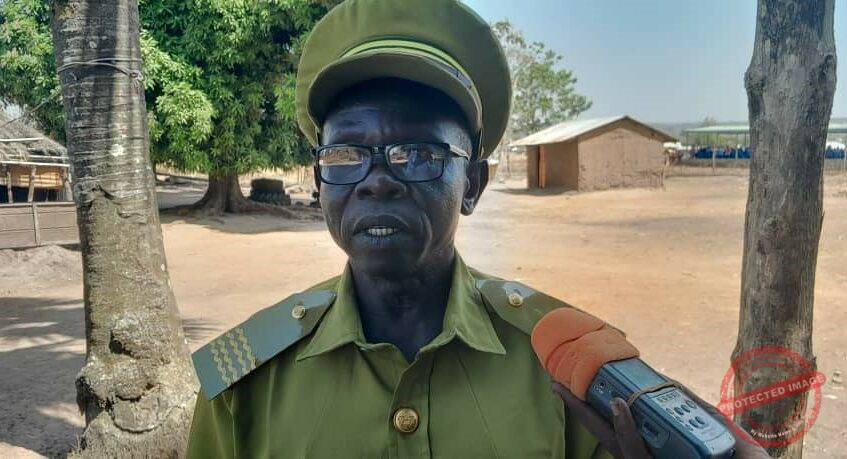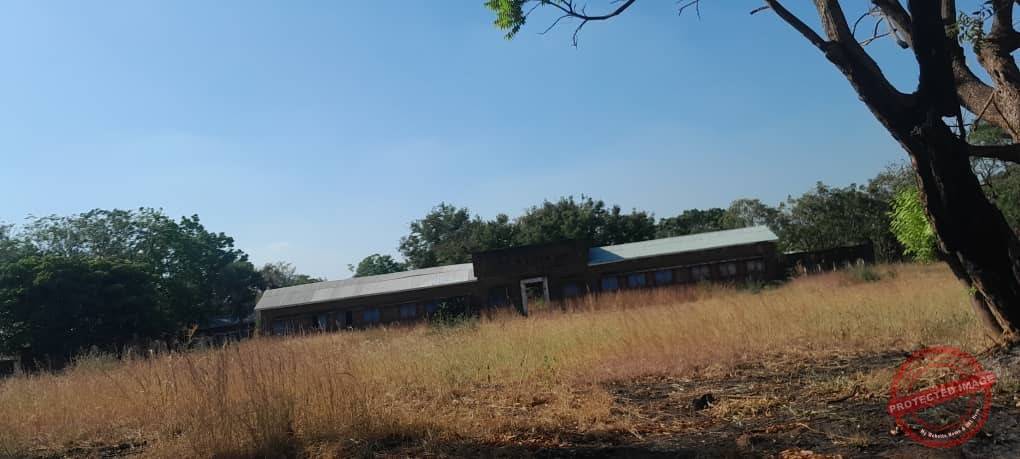
Samuel Modi, a chief in Lainya County, spoke to Eye Radio on February 7, 2024. (Photo: Obaj Okuj)
Thousands of displaced civilians who returned home to Lainya County in Central Equatoria State, are confronted with a crumbled educational system and lack of secondary schools, leading to increasing dropouts, authorities said.
Lainya traditional chiefs and local residents fear that the absence of high schools has caused a spike in Gender Based Violence (GBV) cases including teenage pregnancies and forced marriages.
The residents underscored the critical need to ensure adequate educational opportunities for children, calling on the government and developmental partners to build more secondary schools in their area.
Mathew Ladu John, the Paramount Chief of Lainya, said the relative peace and stability in the area, has caused an influx of returnees with thousands of children who are unable to continue their studies.
Mr. Lado called on the government to construct secondary schools in Lainya so that children can return to learning.
“I am calling on our government to at least build a senior school in Lainya because there is an increase in the population due to the coming of returnees,” he said in an interview with Eye Radio.
“There are a lot of children who have finished primary 8, but they stay without further studies because there’s no money to take them to Uganda or other places.”
“That’s why we are saying if there is a way let them build secondary schools, because we have a big land. After we have sat down with the community have chosen three areas if agreed to build school there.”
Currently, there’s only one government high school in Lainya – Loka Secondary School – which is not currently functional after it was badly damaged during the conflict in 2016.

The situation has forced thousands of school children who graduate from the local primary schools to either stay at home for the unforeseeable future, exposing them to the dangers of domestic violence, pregnancies, early and forced marriage.
Another chief, Samuel Modi, said there is only one private secondary school in Lainya town, which is very far and too expensive for the locals.
He emphasized on more secondary schools to prevent the girls from dropout from schools.
“We don’t have a secondary school to help those kids. Again, we have only one secondary school for the community and going to school has been very difficult, and with the poor people, it is not easy to afford,” said Modi.
“That’s why some girls are unable to finish their studies. That’s why we need the government to build a secondary school for better future for our children in Lainya County.”
Joseph Amule, a youth representative Lainya County, said the absence of enough secondary schools has long affected Lainya without being addressed.
Joseph Amule appeals to the government and partners to provide scholarships and establish additional secondary schools in Lainya County.
“I think the issue of the secondary school has been one of the biggest problems in the history of Lainya County. We have only one government secondary school there, but up to now because of the conflict it has been stopped,” he said.
“To address this, we trying to talk to agencies to address this to at least avail scholarships to the students so that they can at least access secondary schools.”
For her part, Harriet Roba, a women representative said she is worried about the consequences of lack of secondary education for children, particularly on young girls.
She warned of the risks of early pregnancies and domestic violence affecting stay-at-home school children, while stressing that establishing a new school could greatly improve the situation.
“A lot of girls have been affected because they cannot continue with their studies because we have only one secondary school,” Harriet said.
“We have children whose caretakers cannot affords to pay their school fees, and other have reached to secondary level and there’s nobody paying them, so they resorted to early marriage.”
Emmanuel Khamis Richard, the Commissioner of Lainya County confirmed the educational challenges facing his people.
Khamis said thousands of people have come back from the refugees’ camps in Uganda and the region, only to find no high schools in the area.
Emmanuel said the population of Lainya is more than 50,000 people, adding that its possible increase with the prevalence of peace, will also lead to more children unable to further their studies.
“Already you have seen yourself, the population will likely increase because Lainya is growing into town. It is not that there are no people, because if there are no people, this project would not have come to reality,” he told Eye Radio, referring to a clean water supply project launched by International Committee of the Red Cross.
“The project is here because there are people. So, take it from me, we have a lot of people, not less than 50,000, who are currently residents of Lainya, and the number is likely to increase.”
Support Eye Radio, the first independent radio broadcaster of news, information & entertainment in South Sudan.
Make a monthly or a one off contribution.
Copyright 2024. All rights reserved. Eye Radio is a product of Eye Media Limited.